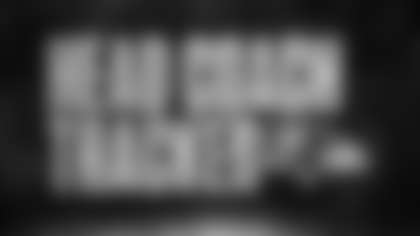John Urschel would have been in Cincinnati right now, perhaps as the Ravens' starting center for their season-opener against the Bengals.
Instead, Urschel will be on the campus of MIT doing math. And, no, he won't be watching.
Urschel called Ravens Head Coach John Harbaugh to inform him that he was retiring, at age 26, just a couple of hours before the team's first training camp practice on July 27.
It also came two days after the results of the most in-depth study on the relationship between playing football and chronic traumatic encephalopathy (CTE) was released in The New York Times, revealing that of 111 NFL players’ brains, 110 had signs of brain damage.
Being that Urschel has a brilliant mind with an extremely bright future in mathematics, the natural conclusion was that Urschel left football because of the study.
Well, not exactly.
Urschel released a statement the day of his retirement, which said he was excited to devote himself to his Ph.D. studies and his growing family (he and his fiancée, Louisa Thomas, are expecting a baby girl in December). Other than that, he's been quiet.
That changed last week when Urschel was the subject of the latest episode of the “Freakonomics Radio” podcast. It's his first interview since the decision.
The biggest question people had when Urschel walked away was about how much the CTE study impacted his decision.
"The easiest way I can explain it is that it was causal in one respect, but not in the way that most people think it was," Urschel said.
"The way that it was causal was that it really re-opened the dialogue within talking to myself and also between myself and my fiancée. It opened a dialogue that I had not opened in an extremely long time."
Urschel's mother had never wanted him to play football. His fiancée also wanted him to stop. But Urschel loved the game too much. Even when friend and former San Francisco 49ers linebacker Chris Borland retired from the game at 24 years old in 2015, Urschel said he didn't consider leaving football.
Urschel had always thought about his longevity. He didn't plan to play football for as long as he could, as others would. Money doesn't matter to him. All he pretty much buys is books (and a house for his mother).
The study, however, made him reconsider what's most important in his life.
"It was not that this new evidence was extremely overwhelming to change my opinion. It's more like this really brings something to my attention in a very real way that, quite frankly, I was more or less aware of but attempting to ignore to a degree," Urschel said.
"The main thing was that I thought about what I was most passionate about and what I was most excited about in life going forward. When I thought about those one or two or three things, when football all-of-a-sudden was not one of these top two or three things, and football is actually actively hindering me from doing some of these things, well then it became a real conversation."
Urschel didn't state what those top three things in his life were, but it could be presumed, in no particular order, that they are Thomas, his soon-to-be-born daughter and math. In that regard, his original statement was totally true. What was a half-truth, however, was that Urschel said he was "excited to start working on my doctorate in mathematics full time at MIT."
In fact, Urschel revealed that he was already a full-time student taking a full-time Ph.D. mathematics course load while he was playing with the Ravens. It wasn't just classes in the offseason. He took extremely high-level math courses last fall.
"I guess since I'm retired, I'm allowed to say I was full-time, full-time," Urschel said. "Via correspondence, I took courses which I thought were very manageable in-season, areas that I was more or less familiar with previously, classes which had a textbook and which the professor followed the textbook. I would do the assignments and then send them in."
On Sundays after a 1 p.m. home game, Urschel would be home by about 5:30 p.m. He would do math from then until 11 a.m. Wednesday, when he reported to the Under Armour Performance Center to begin preparations for the team's next opponent. Once that began, math was put to the side. Still, Urschel didn't tell anyone.
"I don't think an NFL team would be extremely happy to hear that I'm working toward a Ph.D. also in the fall," he said.
When Urschel called Harbaugh to inform him of his retirement, he thanked his head coach and the Ravens because "quite frankly, I loved my time in the NFL. I loved my time with the Ravens." Harbaugh expressed that he had the utmost respect for Urschel, and Urschel stressed mutual feelings.
Since then, Harbaugh has even called Urschel to check in and see how things were going at MIT, where Urschel now lives with Thomas. While the Ravens were in training camp, Urschel and Thomas recently took a vacation together to St. Louis, the site of an elite chess tournament.
Urschel cast some skepticism on the CTE study, pointing out what many others have: that it contains self-selection bias. The brains studied were donated by those who suspected they could have damage.
He still believes there's no way to know with certainty what, or how high, the risks are. He doesn't know if he's personally harmed his brain's health, saying he "highly, highly doubts" that there's a 99 percent or zero percent chance that he will have CTE someday.
But there's one thing he knows for sure: he does not want to hurt the game of football with his decision to retire.
"This was actually a serious, serious concern of mine," Urschel said. "Yes, I am retiring; I did retire. But at the same time, I love the NFL. I love football. I wouldn't trade my experiences for the world. I do believe that football is a great game. I didn't want to be fodder for anti-football establishments."



















